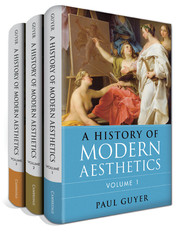Book contents
- Volume 1 The Eighteenth Century
- Volume 2 The Nineteenth Century
- Frontmatter
- Contents
- Acknowledgments
- Introduction
- Part One German Aesthetics in the First Half of the Nineteenth Century
- 1 Early Romanticism and Idealism
- 2 High Romanticism in the Shadow of Schelling
- 3 The High Tide of Idealism
- 4 In the Wake of Hegel
- Part Two (Mostly) British Aesthetics in the Second Half of the Nineteenth Century
- Part Three German Aesthetics in the Second Half of the Nineteenth Century
- Bibliography
- Index
- Volume 3 The Twentieth Century
- References
3 - The High Tide of Idealism
Schopenhauer, Hegel, and Schleiermacher
from Part One - German Aesthetics in the First Half of the Nineteenth Century
Published online by Cambridge University Press: 05 June 2015
- Volume 1 The Eighteenth Century
- Volume 2 The Nineteenth Century
- Frontmatter
- Contents
- Acknowledgments
- Introduction
- Part One German Aesthetics in the First Half of the Nineteenth Century
- 1 Early Romanticism and Idealism
- 2 High Romanticism in the Shadow of Schelling
- 3 The High Tide of Idealism
- 4 In the Wake of Hegel
- Part Two (Mostly) British Aesthetics in the Second Half of the Nineteenth Century
- Part Three German Aesthetics in the Second Half of the Nineteenth Century
- Bibliography
- Index
- Volume 3 The Twentieth Century
- References
Summary
We have just seen that while Schelling’s cognitivist approach to aesthetics excluded any place for the free play of the imagination and had little room for the emotional impact of art, and at least some of those within his penumbra, such as Emerson, retained his cognitivist approach, at least some others among the wide range of thinkers and poets to whom Schelling’s influence was communicated by Coleridge, including Wordsworth, Shelley, and Mill, gradually found ways to combine emotion with truth in their conceptions of aesthetic experience. Now we return to the next two leading philosophers of German Idealism − Arthur Schopenhauer, almost as precocious as Schelling, and Hegel, older but slower to publish − and see that for all their differences they both accepted a strictly cognitivist approach to aesthetics and were as hostile as Kant himself had been to the emotional impact of art. In the final section of this chapter, we will see that one of their contemporaries in Berlin, the theologian Schleiermacher, took a less reductive approach to aesthetics, but his course on the subject did not have an immediate effect on the field. Instead, Hegel’s aesthetics would dominate the subject in Germany for at least three decades following his death in 1830, while after that Schopenhauer’s approach would influence not only the further development of aesthetics itself but a wide range of creative artists across Europe.
- Type
- Chapter
- Information
- A History of Modern Aesthetics , pp. 106 - 152Publisher: Cambridge University PressPrint publication year: 2014



